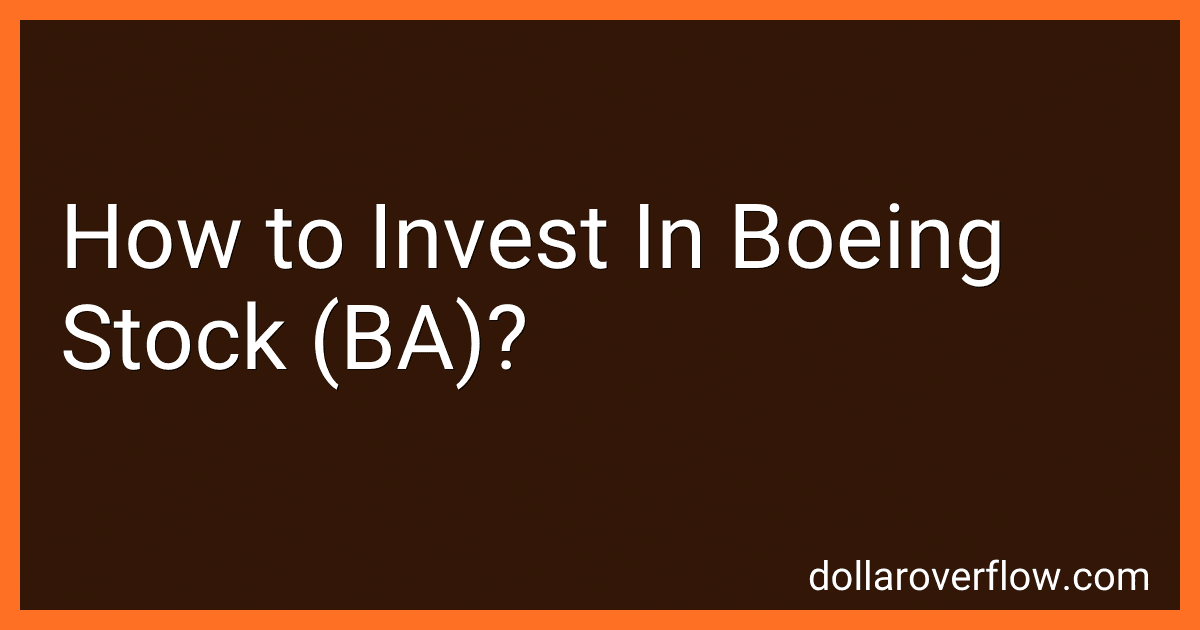To invest in Boeing stock (BA), you can start by conducting thorough research on the company's financial performance, competitive landscape, and future prospects. Next, open a brokerage account with a reputable online broker that allows you to buy and sell shares of Boeing stock. Once your account is set up, decide how much money you want to invest and place an order to buy Boeing shares. Keep track of the stock's performance and stay informed about any news or developments that may impact the company's stock price. It is also recommended to diversify your investment portfolio to reduce risk.
How to evaluate the return on equity and return on assets of Boeing as indicators of profitability?
To evaluate the return on equity (ROE) and return on assets (ROA) of Boeing as indicators of profitability, you can follow these steps:
- Calculate the Return on Equity (ROE): ROE is a measure of a company's profitability that shows how much profit a company generates with the money shareholders have invested. The formula for calculating ROE is: ROE = Net Income / Shareholder's Equity
- Calculate the Return on Assets (ROA): ROA is a measure of a company's profitability that shows how efficient a company is at using its assets to generate earnings. The formula for calculating ROA is: ROA = Net Income / Average Total Assets
- Compare the ROE and ROA values with industry benchmarks or historical performance to see how Boeing's profitability metrics compare to its peers or its own past performance.
- Look for trends in the ROE and ROA values over time. Increasing values of ROE and ROA might indicate improved profitability, while decreasing values might suggest declining profitability.
- Consider other financial metrics and factors that could impact profitability, such as revenue growth, profit margins, debt levels, and market conditions.
By evaluating the ROE and ROA of Boeing as indicators of profitability, you can assess how effectively the company is generating profits from its investments and assets, and make informed decisions about its financial performance.
What is the impact of environmental regulations on Boeing's business model and stock performance?
Environmental regulations can have a significant impact on Boeing's business model and stock performance. Some of the main ways in which environmental regulations can affect Boeing include:
- Increased costs: Compliance with environmental regulations often requires companies to invest in new technologies and processes to reduce their carbon emissions and other environmental impacts. This can lead to increased operating costs for Boeing, which can impact its profitability and stock performance.
- Regulatory risks: Non-compliance with environmental regulations can result in fines and penalties, as well as damage to Boeing's reputation. This can have a negative impact on the company's stock performance and overall business model.
- Market demand: As consumers and investors become more environmentally conscious, there may be increased demand for more environmentally friendly products and services. Boeing may need to adapt its business model to meet these changing market demands, which can impact its stock performance.
Overall, environmental regulations can have a significant impact on Boeing's business model and stock performance by increasing costs, creating regulatory risks, and affecting market demand for its products and services. It is important for Boeing to stay abreast of changing environmental regulations and adapt its business practices accordingly to remain competitive in the market.
What is the dividend yield of Boeing stock (BA) and how does it compare to other stocks?
As of the most recent data available, the dividend yield of Boeing stock (BA) is 1.59%. This means that for every $100 invested in Boeing stock, an investor would receive $1.59 in annual dividend payments.
In comparison to other stocks, Boeing's dividend yield is relatively low. Many companies in the same industry or sector may offer higher dividend yields. It is important to consider not only the dividend yield, but also the overall financial health and stability of the company when making investment decisions.
